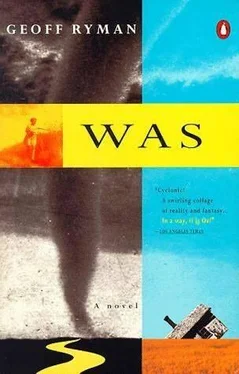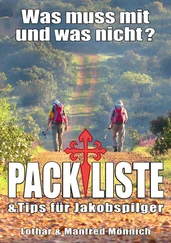"So we've got about eight big pages to look through. What were those names again?"
"Branscomb or Gael," said Bill.
"That's right, or another name if there was a marriage."
Another huge book thumped down on the sloping desk, and Sector 25, Township 10, Range 8, was found, northwest and southwest.
"Pillsbury, Lewis, Long and… Monroe Scranton," she murmured.
"Monroe Scranton?" said Jonathan, leaping forward, slightly frog-like. "He was hung for stealing Ed Pillsbury's horses!"
Sally looked up. "Really? How do you know that?"
"I read it last night."
"Well I'll trade you. This guy Lewis here was jailed for theft. And this guy Long lost the property because he didn't pay his taxes. So this was kind of the bad corner of Zeandale. But…" she scanned the page. "No Branscomb or Gael."
She turned the page. "Look at this. This is why we have so much trouble. You got L. H. Pillsbury deeding this quarter to Minerva Wiley in April '82, and then it goes in reverse in the same month-well, she mortgages to him. But then in September '82, you got George Pillsbury giving it to L. H. Pillsbury by relation-but it just doesn't show how George got it. Then in '83 the District Court is giving it to Minerva. Oh, I get it! They've divided the quarters into halves. And I bet that court deed is a divorce."
Jonathan was making a rapid hissing noise through his nostrils.
"Jonathan," asked Bill, "are the tips of your fingers buzzing?"
Jonathan looked around at him in woozy surprise. "How did you know?"
"Because you're hyperventilating. Just breathe slowly, calmly." Bill's hands and chest moved outward, slowly, showing him how to breathe. "Relax. We have all day."
"We only have today!" said Jonathan, in sharp dismay. His face crumpled up.
Sally ignored it. "Right, next page," she said lightly, and looked up and around, still smiling. "Sorry, I just find all of this so much fun, I get distracted."
And her glance caught Bill's as she looked back to the pages.
I wonder how far you've gotten, Bill thought. He watched her scanning the pages. I would say you've probably decided that Jonathan is not exactly a mental patient. You've probably decided there is a physiological element. You're used to puzzles. I wonder if you've worked this one out.
"Here we go," said Sally. "Branscomb." She stepped back and tapped the place with a fingernail.
"You found it?" Jonathan's voice rose high and thin.
The farm was listed in Sector 26, southeast quarter. It passed from J. Pillsbury to E. Pillsbury to Branscomb, all in 1857. They were listed out of date order, widely separated by other sales or mortgages, mostly in the early 1900s. The next entry by date was in 1890-a deed to J. Pillsbury from the government.
"That will just be a late copy entry," said Sally. "I bet when we look at it, the deed will be typed, with a typed signature of Abraham Lincoln."
"So what's the story?" Bill asked.
"Matthew gets in it 1857…" Silence. Sally read, chin resting on her hand. "After that, I don't know. In 1890 it passes from the Pillsburys to the Eakins, So maybe it did go back to the government and then to the Pillsburys."
"That is the farm, though," insisted Jonathan.
"We don't see it passing from Matthew to anyone," said Bill. "Not even his daughter?"
"They should show it passing by relation, but they don't." Sally lifted her hands up and let them drop. "Sometimes they didn't."
"What we're looking for," said Bill, "is the farm going to Emma, and then from Emma to her husband. That way we would know her married name."
"That is the farm, isn't it?" Jonathan's voice rose.
"Unless Matthew had some land somewhere else as well," said Sally.
"That's not the farm?" Jonathan danced with confusion.
Sally looked at him. "Oh, we'll find it. We know it's somewhere around here."
They skimmed the other pages. There was no other entry for Branscomb.
"Okay," said Sally, still cheerful. "That means that must be the farm. Come on, I'll show you."
She walked to the map. "There it is," she said, pointing. The sectors looked dead and cold.
"Could we find the farm from this map?" Bill asked.
"Sure! Sure we could!" exclaimed Jonathan. "Couldn't we?"
Sally's boss came in. "Excuse me. Sally, there's a call for you about those mineral rights in Ogden. I'm sorry, gentlemen."
"I don't know how these sector maps relate to the roads. What I suggest you do," said Sally, talking quickly, "is find that schoolhouse. Get hold of a plat book or something and use the schoolhouse to orient yourself."
"Sally, I'm sorry, they're holding on."
"Okay," said Sally. "Let me know what happens, huh?" She backed away, toward the outer office. She looked directly at Bill and said, "Take care of him."
"Back so soon?" said the pale young man at the museum.
Jonathan seemed to blurt his way through the door, like an unintended remark. He did not wait for the young man to step aside from the entrance and jostled into him. The young man's lips went thin.
"We got it," said Jonathan. "We found the farm!" He was as awkward as a newborn colt. "We know the school she went to, so we can find the farm from that. Zeandale Township, Sector Twenty-six."
"Hold it. Hold it," said the young man.
Jonathan wavered in place, unable to understand why the librarian didn't show more enthusiasm.
"What would you like to look at?"
"Hello," said Bill. "We need to find a particular schoolhouse and farm in Zeandale. Basically, I think if we had a plat book for the 1870s, 1880s, that would help."
The young man breathed out. "Do you mind telling me what this is for? Is it a research project? Is it connected with KSU?"
"It's only a personal interest," said Bill. "We'd be happy to talk to somebody if that would help."
The young man sighed. "Our director is Kathy James. She'll be in about ten today. If you wouldn't mind talking to her."
"Thank you, I'd be happy to."
Back in the big, book-lined room. Hole punches and paper cutters, index printouts, stacks of wooden drawers out of their chests, cardboard tubes with maps inside, globes of the world.
"We've got a very good plat book for 1881," said the young man. "It has engravings of local farms, shows the railways, has a list of businesses."
"Perfect. Thank you," said Bill.
"Your friend owes us ten sixty for photocopies," said the young man. "He left without paying."
"I'm sorry," said Bill. "He's very ill."
The pale young man walked around to the front of the filing cabinets. They faced the wall. Bill sat down at the table, opposite Jonathan.
Jonathan's knees bounced up and down, and the rims of his eyes looked almost brown. He had thrown up his breakfast soup.
"How ya doing, buddy?" Bill whispered.
"I'm going to ring the church bell," answered Jonathan.
"Which church bell?" Bill asked quietly.
"The one in the little tower. In the school."
Then Jonathan looked up in the direction of the doorway and beamed and greeted someone. "Hello," he said.
Bill turned around in his chair. There was no one.
"Who's been visiting?" Bill asked.
"Ira was standing beside the Coke machine," said Jonathan.
"Was he?" said Bill.
"He hadn't graduated yet."
There was the sound of a filing cabinet rumbling shut.
"This do you?" asked the librarian.
He passed Bill a Xerox. It showed a sweep of river in flowing curves and centipede lines of railways. Manhattan the town was blanked out by corduroy lines. At the bottom of the page there was a very fine, tiny engraving of a man on horseback looking at a distant train.
Jonathan stood up and rested his chin on Bill's shoulder, as if it were a pillow.
There was a little square marked "No. 43." It was on the corner of the main road and a lane that ran south toward hills. There were the sectors and quarters with names.
Читать дальше












